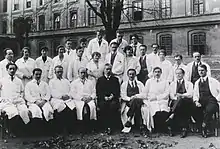Alexandra Adler
Alexandra Adler (24 September 1901 – 4 January 2001) was an Austrian neurologist and the daughter of psychoanalyst Alfred Adler. She has been described as one of the "leading systematizers and interpreters" of Adlerian psychology.[1] In 1937, Adler and Tracy Jackson Putnam conducted a study on a brain of a multiple sclerosis victim. Illustrations from the study are frequently used in medical literature.[1] Adler's detailed studies on 500 survivors of the Cocoanut Grove fire is noted as some of the earliest research on posttraumatic stress disorder.[1] Adler discovered that many of the survivors suffered from unsettled grief, particular changes in personality such as guilt and diminished vitality, and an increase in sleep disturbances and anxiety.[2] Her sister was Socialist activist Valentine Adler.[3]
| Alexandra Adler | |
|---|---|
 Julius Wagner-Jauregg's staff in 1927 | |
| Born | 24 September 1901 Vienna |
| Died | 4 January 2001 |
| Occupation | Psychiatrist, neurologist |
Career
Adler completed her medical studies at the University of Vienna in 1926, and then specialized in psychiatry at the University of Vienna Neuropsychiatric Hospital. She emigrated to the United States in 1935, where she worked as a neurology instructor at the Harvard Medical School. In 1946 she joined New York University College of Medicine's psychiatry department, and became a professor there in 1969.[1]
Sources
- Vande Kemp, Hendrika (Spring 2003). "Alexandra Adler, 1901-2001" (reprint). The Feminist Psychologist. Society for the Psychology of Women. 30 (2). Retrieved 2012-10-08.
- Adler, Alexandra (1943). "Neuropsychiatric complications in victims of Boston's Coconut Grove disaster". Journal of the American Medical Association. 123 (17): 1098–1101. doi:10.1001/jama.1943.02840520014004 – via The JAMA Network.
- "Adler, Valentine (1898–1942)". Women in World History: A Biographical Encyclopedia. Gale Research Inc. Archived from the original on 18 May 2013. Retrieved 10 January 2013.(subscription required)